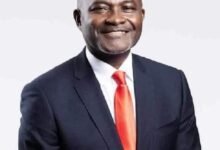‘NPP or NDC can scrap E-levy, betting tax; it won’t cost economy much’
ASSOCIATE Professor of Finance at Andrews University in the United States, Prof. Williams Kwasi Peprah, has stated that it is possible for Ghana to eliminate betting taxes and electronic transaction levy (E-levy) without any major consequences for the economy.
According to him, the feasibility was largely premised on the prudent management of Ghana’s resources by the political class which would reduce wastage in the system.
He was speaking in response to the pledge by the presidential candidates of the two main political parties, the New Patriotic Party (NPP) and the National Democratic Congress (NDC) to scrap the two taxes when given the political mandate.
While some have welcomed the pledge, others are of the view taking it off will deny government of the needed revenue for national development considering that the country is currently under an International Monetary Fund (IMF) programme.
Speaking on JoyFM’s Midday News yesterday, Professor Peprah said the current amount generated in revenues from these taxes was relatively insignificant hence scrapping it would have no effect on the economy.
“From what I have gathered just looking at the internal audit agency report, this is something that both parties can do. From 2017 till date, infractions detected by the internal agency through their audit report in areas of procurement irregularities over payment, unapproved transactions and payment for contracts not done, it comes to approximately GH¢51 billion,” he said.
He said “So far for the e-levy, the government has collected GH¢810 million, and for the betting tax, the government has collected GH¢15 million so if you look at the amount involved, they are not very significant.”
He explained that although the government had projected GH¢1.2 billion from each of the taxes, it was yet to achieve its target.
He said “So if both parties are able to focus on eliminating waste as specifically the NDC presidential candidate is saying and reducing and prioritising some payments, it is very easy for them to do away with these two taxes.”







